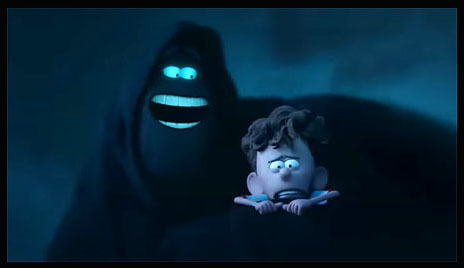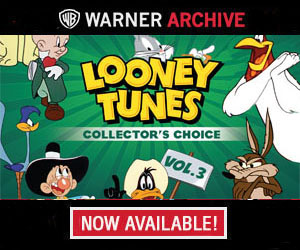
Director Sean Charmatz and Producer Peter McCown present the ambitious and memorable new DreamWorks animated feature Orion and the Dark. The family adventure from writer Charlie Kaufman, who adapts from Emma Yarlett’s book, debuts this Friday February 2nd on Netflix. This Animation Scoop Q&A shines a light on how one of the first major animated movies of 2024 was made. (This interview was edited for length and clarity.)
Jackson Murphy: Sean, this is your feature directorial debut — about fifth grader Orion meeting Dark. It is an epic story. First, how did you want to present their evolving relationship in this movie?
Sean Charmatz: I wanted to present it in an authentic way that felt honest and true, and we tried really hard to do that. I think we did it.

JM: I think you did it, too. I think you did a terrific job. I love the dynamic between the two characters. And Peter, I love the sweeping, cinematic nature of it all, as Dark takes Orion around the world to show him the good of the world. What do you love about the sweeping nature that this movie has?
Peter McCown: I think that was really important to us. We wanted to have it global. He’s got to travel — literally. They both have to go around the entire world, and they’re going to visit different points in the world. And it was really cool… we’re crossing the Great Lakes and we go on Santa Monica Pier and then we’re in Hawaii for a beat. And as the night moves around the world, how do we represent these individuals without having to build the entire world in animation? That’s tough to do. So we came up with really creative and economical [ways]… using Digimats or using paintings a lot and parts of the set — not having to build up full sets — to be able to achieve going to all these different locations. What allowed us to do that was the stylization of this film from the get go, which we wanted to feel painterly. We wanted it to feel raw. We wanted to borrow some from Emma Yarlett’s book and the watercolors. And so using that to our advantage I think really pay dividends in the fact that we could go around the globe and visit all these different locations.
JM: Yeah, it’s so cool. And what blew me away at the beginning of the movie is this narration monologue that Orion has about fears and about life and about what he’s going through. I think it is going to speak to people of all ages. Sean, how did you want to showcase… the fears that Orion has, but also a lot of real fears and real challenges that a lot of people are facing right now in their lives?
SC: Luckily, so much of it was in the script already from Charlie [Kaufman] and Charlie is such a brilliant writer and artist and, and character creator that I felt like it was already there. And in terms of how to handle Orion, I was just there to make sure that we carried it through. But again, the honest answer is that I wanted it to feel real and genuine. He’s a real kid with real anxieties with real fears. Relatability for the kid was something we said almost every day at the beginning.

JM: You do a fantastic job with that. And Peter, Charlie Kaufman is a very inventive guy. A creative guy. Directed the animated film “Anomalisa” close to a decade ago, and adapts Emma Yarlett’s book here. He’s got guts! You all have guts when it comes to what you present in this movie. What amazes you about the guts that Charlie Kaufman has with this script?
PM: Sean and I are huge fans of Charlie. I studied him for a semester in film school. I’m obsessed. I just love his work, and he breaks convention. And he doesn’t tell a story as you, at least an animated story, that you would expect structurally, and that can be uncomfortable for some viewers for a minute, but then it kind of pulls it together, and I love that. I love that he bucks tradition and he takes you on these journeys that you’re at some point wondering where it’s going to take you. And then when it resolves, it’s extremely satisfying. We kept saying it while we were making it: “We’re probably never going to be able to work on a script like this again.” It doesn’t follow that traditional structure that we’re so used to being kind of conformed to.
SC: He’s such a great artist. Bravely, often, those kinds of scripts don’t get to us at DreamWorks. Those artists don’t get to be a part of this, this sort of animated industry, because the focus is Four Quadrant and all those things. But luckily, we’re able to just… make this film pretty, pretty purely like Charlie wrote it.
PM: And it took guts, honestly from DreamWorks executives and Margie Cohn and Netflix executives to say, “We’re gonna do this. We want to make this film this way”. Allowing us to do that and embracing it was really cool.

Producer Peter McCown and Director Sean Charmatz
SC: Cheering us on and crying. We saw tears from executives at screenings and the support was really helpful in terms of having to be brave because the executives definitely made us feel like they believed in the film.
JM: That’s nice. Sean, the characters in the film are so vibrant. What went into the designs of them? There are a lot of ways you could have interpreted Dark’s look. What went into some of these characters?
SC: Well, there was some description in the script from Charlie, which was a great starting point. He said something about an inky black cloak in the script. So I think that my mind went to like a Grim Reaper type of character. And then with the help of an amazing designer named Joe Pitt, and our production designer, Tim Lamb, they explored Dark from the Grim Reaper point of view. And then in terms of the other entities, I think that it was just them being amazing designers and thinkers and Peter and I just reacting really excitedly to brilliant work that was coming from our team.
PM: And I think being able to play in that world of crafting a story and knowing that a lot of what we see is being crafted by the characters that we’re following in the film. How can you layer that in with what we’ve seen? There’s little Easter eggs if you go in and watch it: “This part of this set or this character’s experience translates into maybe one of the entities because they maybe have born this character out of their imagination.”

JM: It’s such a cool film on so many different levels. And it’s also fun for animation fans to get to listen to Jacob Tremblay, who’s been in a bunch of projects in the last few years, just knock it out of the park again here as Orion. And Paul Walter Hauser, who just won an Emmy for “Black Bird”, and is one of the most fascinating actors working in the business today. Peter, what do you love about the dynamic between these two great actors?
PM: They both bring a vulnerability and kind of an intelligent depth to each one of their characters. I think Jacob is such a brilliant actor as we’ve seen in his still young career. He’s wise beyond his years. And I think that was extremely important for Orion to have somebody who could act like almost a little adult caged in this 11 year old’s body, who’s very smart, funny and super, super thoughtful about things. So he brings it and he nails it from there. And Paul Walter Hauser is brilliant. And Sean gets just about all the credit for that because he flagged Paul as, “I think this guy is going to be perfect for this role.” And he’s absolutely right. Paul brought such a new dynamic to this film and elevated Dark and brought him to his full potential.
SC: I feel like Jacob sounds like a real boy and Paul naturally sounds a little bit Muppety to me. Without trying to, he has a voice that I think if you close your eyes, you can imagine he could be something other than a human. And I wanted that contrast between Orion and Dark. This idea that Dark is not human, that he is a god like entity, and I think Paul’s natural timbre and voice sounds a little Muppety to me, and I think that was important to me that you hear that dynamic between the two voices.

JM: What would you tell kids, or adults, who are watching this, who are fearing something right now, or something is holding them back? This movie has a lot to say about that. After making this movie, what would you say to people feeling this way right now?
PM: It was important to us to not shy away from the idea of having fear because no matter your age, whether you’re 5 or 95, you’re always going to have fear of some form. And I think it’s important to acknowledge that. That’s a big step for someone to acknowledge that, and to lean into it, and recognize that’s always going to be there. I’m always going to be afraid, but can your capacity to handle that fear grow? And that’s the real change, and that’s the real lesson that hopefully resounds and resonates with everybody. It’s gonna be there, but your ability to deal with it is what true growth and true bravery is, I think.
SC: I would tell them to watch the movie. And it could help.
- INTERVIEW: Strap In For “Mars Express” - April 30, 2024
- INTERVIEW: Jeff Fowler On “Knuckles” And “Sonic 3” - April 22, 2024
- INTERVIEW: “Inside Out 2” Director And Producer On Pixar Sequel - April 16, 2024


 January 30th, 2024
January 30th, 2024  Jackson Murphy
Jackson Murphy  Posted in
Posted in  Tags:
Tags: 






